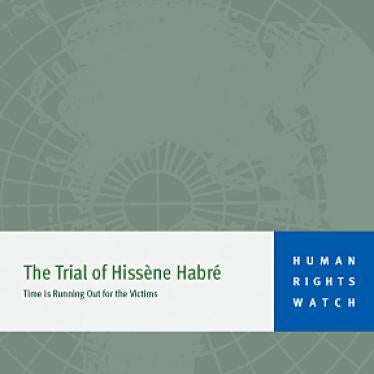(Brussels) – The agreement signed between Senegal and the African Union (AU) on August 22, 2012, to establish a special court to try the former dictator of Chad, Hissène Habré, is an important step in the long campaign to bring him to justice, a coalition of human rights groups said today.
Habré is accused of thousands of political killings and systematic torture when he ruled Chad, from 1982 to 1990. Habréhas been living in exile in Senegal for more than 21 years but has yet to face justice there.
“We are one step closer to justice today,” said Alioune Tine, president of the Dakar-based African Assembly for the Defense of Human Rights (RADDHO). “We’re counting on Senegal and the African Union to move quickly now and to begin Habré’s trial before even more survivors die.”
The International Committee for the Fair Trial of Hissène Habré said that international donors should agree to fund the new court to ensure plans move forward swiftly.
The International Committee includes the RADDHO, the Chadian Association for the Promotion and Defense of Human Rights (ATPDH), the Association of Victims of Crimes of the Regime of Hissène Habré (AVCRHH), Human Rights Watch, the International Federation of Human Rights (FIDH), the Senegalese League for Human Rights, and Agir Ensemble pour les Droits de l’Homme, among others.
Negotiations in July between the African Union and Senegal resulted in a plan to try Habré before a special court in the Senegalese justice system with African judges appointed by the AU presiding over his trial and any appeal. The August 22 agreement commits the parties to the plan and to a timetable that would have the court operational by the end of the year.
The new agreement calls for “Extraordinary African Chambers” to be created inside the existing Senegalese court structure in Dakar. The chambers will have sections to handle investigations, trials, and appeals. The trial court and the appeals court will each consist of two Senegalese judges and a president from another African country.
The chambers’ mandate will be to prosecute the person or persons most responsible for international crimes committed in Chad between 1982 and 1990, including genocide, crimes against humanity, war crimes, and torture. It is expected, however, that only Habré will be tried before the court.
To ensure that trials are efficient and do not drag on for years, prosecutors may pursue “the most serious” of Habré’s crimes, rather than charging him with all the acts of which he is accused. Prosecutors may also introduce as evidence the results of prior Belgian and Chadian investigations into Habré’s alleged crimes.
A Belgian judge and his team spent nearly four years investigating Habré’s crimes before indicting him on charges of crimes against humanity, war crimes, and torture in 2005, leading Belgium to request his extradition from Senegal. A 1992 National Truth Commission in Chad accused Habré’s government of systemic torture and up to 40,000 political assassinations.
The coalition called for the establishment of a strong management committee – consisting of Senegal, the AU, and donor countries – to ensure sound financial management of the court’s budget, supervise training of judicial staff, and oversee outreach to the Chadian public.
“It is fundamental to place the victims at the heart of the process and the court’s statute goes to great lengths to ensure that Habré’s trial is meaningful to them,” said Dobian Assingar of the FIDH, and honorary president of the Chadian League for Human Rights. “The new court could also set a significant precedent for the broader fight against impunity in Africa.”
Victims will be permitted to participate in proceedings as civil parties, represented by legal counsel, and to seek reparations from the court or from a voluntary victims’ fund. Reparations will be available even in cases in which victims do not participate in Habré’s trial. The court’s statute provides for trial proceedings to be recorded for broadcast in Chad and for public access to the trial by journalists and non-governmental organizations.
In November 2010, after years of wrangling, Senegal and donor countries had agreed to a budget of €8.6 million (US$11.4 million) for Habré’s trial in Senegal. However, in May 2011, Senegal walked out of negotiations with the AU over the planning of the trial. Since nearly two years have elapsed since the donors’ initial pledges of funding, Senegal must seek newfunding commitments and has indicated that it will do so rapidly. Senegal’s justice minister, Aminata Touré, has said that, unlike the previous government, Senegal will not delay the start of proceedings until full funding has been obtained.
The commitments made in 2010 were by: Chad (2 billion CFA francs or US$3,743,000), the European Union (€2 million), Belgium (€1 million), the Netherlands (€1 million), the African Union (US$1 million), Germany (€500,000), France (€300,000), and Luxembourg (€100,000).
During US Secretary of State Hillary Clinton’s trip to Senegal on August 1, she pledged “to help in every way” with Habré’s prosecution.
“Over the years, the international community has been crucial in pressing Senegal to ensure that Habré would face justice,” said Reed Brody, counsel for Human Rights Watch. “Given the potentially groundbreaking nature of this trial, and Senegal’s rapid advances, we hope that donors will help finance the new court.”






